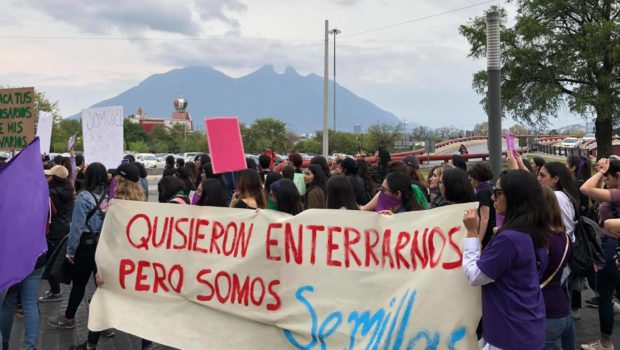A Long Way to Go to Decriminalize Abortion
Un camino largo aún por recorrer. Despenalizar el aborto
Adriana Pacheco
|
Getting your Trinity Audio player ready...
|
On September 6, 2023, several newspapers around the world turned their eyes towards Mexico because of the Supreme Court’s decision to repeal the criminalization of abortion and to establish that federal health institutions such as ISSSTE, Social Security or the Ministry of Health and Assistance can now perform abortions without questionning women. This great achievement is the result of years of struggle and small and large advances of groups that for decades have been seeking for women to have the right to decide and have access to health services for the interruption of pregnancy in a legal and safe way. This news gives us the opportunity to review some aspects of this important issue and how much has happened at the continental level in recent years. The purpose of today’s contribution is to reflect on this and thus commemorate September 28th, the Day for the Decriminalization and Legalization of Abortion, established in Argentina in 1990 at the V Latin American and Caribbean Feminist Meeting.
First of all, a lot needs to be said about the organized work, courage and the great role played by organized groups in Latin America, especially in Argentina, Mexico and Colombia, where the emergence of the “Green Tide” phenomenon, initiated precisely on September 28 in 2017 in Argentina, has energized other nations. The movement made up of activists, artists and writers, and which has been supported and disseminated by writers such as Claudia Piñeiro, Selva Almada and Gabriela Cabezón Cámara, have formed a collective voice that, under a green handkerchief -between Pantone’s 347 C and 3415 C, inspired by the white handkerchief of the Mothers of the Plaza de Mayo- has brought substantial changes to the laws of various countries. It has not worked in all of them, but the case of Mexico encourages this fight.
The changes have been gradual. In Argentina, for example, on January 24, 2021 -a year in which it was estimated that more than 50,000 women were hospitalized due to complications from clandestine and unsafe abortions- Law 27,610 comes into force, giving women the right to interrupt their pregnancy, protecting them in the “voluntary interruption of pregnancy” (IVE) up to 14 weeks and the “legal interruption of pregnancy” (ILE), in case of rape or if their lives are in danger. In Colombia, in February 2022, Ruling C-055 will decriminalize abortions performed up to 24 weeks and recognize safe abortion as a fundamental element of women’s sexual and reproductive health. To date, only 7 countries in the Caribbean and Latin America have safe abortion: Cuba (1961), Puerto Rico (1973), French Guyana (1975), Guyana (1995), Uruguay (2012), Argentina (2021), Colombia (2022) and now Mexico (2023). However, much has been seen that even in countries where it has been decriminalized and is seen as a right, there are “a whole range of grays” to interpret the Law or to assist women, putting obstacles for them to have the procedure, as stated in the report Laws and Shadows. Regulation of Abortion in Latin America, presented at the VII Conference of the Latin American Consortium Against Unsafe Abortion (CLACAI).
In contrast to these countries are others such as Brazil that continue to be bound by laws such as articles 124 to 127 of the Brazilian Penal Code, which says that abortion is only permitted when it is the result of rape or when the woman’s life is in danger. The punishment in that country ranges from 1 to 3 years in prison. In other countries the law is even more severe as in the case of El Salvador, Haiti, Honduras, Nicaragua, Suriname, Jamaica and Dominican Republic, where abortion is criminalized always and under any circumstance.
In the case of other countries, the resistance of conservative groups has reversed achievements that had been obtained, such as what is happening in the United States. We still have the bitter taste of the moment when the Texas Senate approved the so-called Bill 8 in September 2021, which made that state the first in the country to reduce the legal time for an abortion to 6 weeks and which opened the possibility of a civil lawsuit against any person who aborts, as well as against whoever helps her in the procedure, transports her or even advises her; besides giving the right to any person to sue her civilly in search of financial compensation.
The snowball that this created, along with other lawsuits such as the one in Mississippi on the number of weeks for a legal abortion, led to something that was already coming. On June 24, 2022, the Supreme Court of Justice abolished the ruling known as “Roe vs. Wade”, established in 1977 and which for almost 50 years had protected women’s right to a safe abortion and not to be criminalized. The fragility of this case and of being able to reverse it lies in the fact that this ruling never became a law, and hence the judges “returned this decision to the people” and to their local representatives, making it a state issue and not a national one.
What has happened since that day to date can be described as a cascade of legal actions to ban abortion and make life even more difficult for those who need to have one. Examples include Florida Governor Ron DeSantis, who in April of this year passed a law making abortion illegal after 6 weeks of pregnancy. Iowa does the same in July. Today, 21 states in the U.S. either ban abortion under any circumstances or are reducing the number of weeks in which it is permitted, as can be seen in the chart published by The New York Times, “Tracking Abortion Bans Across the Country”. What is concerning about this slow conservative advance is that in order to counteract it, it must be fought from the courts, at a time when the political situation of the country is not helping and when conservative groups are gaining political space and investing large amounts of money to achieve it.
The case of Mexico presents another scenario in which the states also play an important role. On the one hand, the repeal of the law is accompanied by the SCJN’s order to the Congress to be executed before the end of the ordinary session. December 15. However, in a country where Federalism gives independence and autonomy to the states and the fact that they have Criminal Codes at the state level, makes the situation more complicated. In other words, in order for this to be valid at the national level, it will be necessary to work state by state to initiate separate processes or amparos to make changes in their Codes. In this case, of the 32 states, where only 12 have already done so, there are still 20 more where the resolution of September 6 will update them and their Congresses will have to make the necessary corrections in their respective Criminal Codes.
The next problem that can be seen coming, as Veronica Esparza of GIRE says in an interview with BBC Mundo, is the time it will take for this to become common knowledge among governmental and health care institutions at the state level so that it is clear what this resolution means and what the facilities have and must do. And, although the law still respects “conscientious objection”, which is of an individual nature, there cannot be an institutional objection in the case of a federal institution. Two other problems will be the release of the women who are already in jail for this alleged crime and the interruption of the proceedings that have already been initiated. The important thing is to release them, to reinstate them and to make restitution for the moral damage they have suffered.
Talk of the right to choose, the right to safe and legal abortion and women’s right to contraceptive methods has been demonized by conservative groups across the continent. Political interests, misinformation and religious bias have historically clouded their view of what is at stake. This is extremely dangerous especially when talking about countries like Mexico, where every year 350,000 teenagers become pregnant, where 9,000 of them are between 10 and 14 years old, or in regions of the world like Latin America and the Caribbean, which have the second highest rate of teenage pregnancies and where the social system prevents the relevant denouncements from being made. In this great effervescence that we are experiencing, something that is clear is that changes to the laws must be accompanied by sex education programs, accompanying the growth of minors and deconstruction of gender roles that reinforce violence as a characteristic of manhood. Books like Cometierra o Miseria by Dolores Reyes, Chicas muertas or Ladrilleros by Selva Almada show us realities that clearly show the weight of a society where the abuse of young women and girls has been normalized, that a pregnant woman who wants to have an abortion is not a criminal, and that men and women are victims of a patriarchal system that must change.
We owe a lot to the “green tide” and to the groups that continue to fight legally for the right to choose; we owe a lot to the social groups that accompany those who are facing this difficult decision.
 Adriana Pacheco, PhD. es investigadora y es escritora. Fundadora del Proyecto Escritoras Mexicanas Contemporáneas y la fundadora y conductora de la página web y podcast Hablemos, Escritoras. Es autora de los libros Romper con la palabra, violencia y género en la obra de escritoras mexicanas contemporáneas y Rompiendo de otras maneras, cineastas, periodistas, dramaturgas y performes. Es miembro del International Board of Advisors en la Universidad de Texas, Austin. Su Twiter es @adrianaXIX_XXI
Adriana Pacheco, PhD. es investigadora y es escritora. Fundadora del Proyecto Escritoras Mexicanas Contemporáneas y la fundadora y conductora de la página web y podcast Hablemos, Escritoras. Es autora de los libros Romper con la palabra, violencia y género en la obra de escritoras mexicanas contemporáneas y Rompiendo de otras maneras, cineastas, periodistas, dramaturgas y performes. Es miembro del International Board of Advisors en la Universidad de Texas, Austin. Su Twiter es @adrianaXIX_XXI
©Literal Publishing. Queda prohibida la reproducción total o parcial de esta publicación. Toda forma de utilización no autorizada será perseguida con lo establecido en la ley federal del derecho de autor.
Las opiniones expresadas por nuestros colaboradores y columnistas son responsabilidad de sus autores y no reflejan necesariamente los puntos de vista de esta revista ni de sus editores, aunque sí refrendamos y respaldamos su derecho a expresarlas en toda su pluralidad. / Our contributors and columnists are solely responsible for the opinions expressed here, which do not necessarily reflect the point of view of this magazine or its editors. However, we do reaffirm and support their right to voice said opinions with full plurality.
El 6 de septiembre de este 2023, decenas de periódicos del mundo pusieron los ojos en México con la noticia de la decisión de la Suprema Corte de Justicia de la Nación de derogar por vía judicial la penalización del aborto y de establecer que las instituciones de salud que dependen de la federación como ISSSTE, Seguro Social o Secretaría de Salubridad y Asistencia lo realicen sin cuestionamientos. Este gran logro es el resultado de años de lucha y pequeños y grandes avances de grupos que desde hace décadas buscan que las mujeres tengan derecho a decidir y acceso a servicios de salud para la interrupción del embarazo de manera legal y segura. Esta noticia nos da la oportunidad de hacer un recuento de algunos aspectos de este importante tema y de lo mucho que ha pasado a nivel continental en los últimos años. Esta contribución del día de hoy tiene como objetivo reflexionar sobre esto y de esta manera conmemorar este 28 de septiembre el Día por la Despenalización y Legalización del Aborto, establecido en Argentina en 1990 en el seno del V Encuentro Feminista Latinoamericano y del Caribe.
En primer lugar, mucho hay que decirse sobre el trabajo organizado, valentía y el gran papel que han jugado grupos organizados en América Latina, especialmente en Argentina, México y Colombia, en donde el surgimiento del fenómeno de la “marea verde”, iniciado precisamente un 28 de septiembre, pero de 2017 en Argentina, ha energizado a otras naciones. El movimiento conformado por activistas, artistas y escritores, y que han apoyado y difundido escritoras como Claudia Piñeiro, Selva Almada y Gabriela Cabezón Cámara, han conformado una voz colectiva que, bajo un pañuelo de color verde —entre el 347 C y el 3415 C de Pantone, inspirado en el pañuelo blanco de las Madres de la plaza de mayo— ha propiciado cambios sustanciales a las leyes de diversos países. No en todos ha funcionado, pero el caso de México anima esta lucha.
Los cambios se han dado poco a poco. En Argentina, por ejemplo, el 24 de enero de 2021 —un año en el que se calculó que más de 50,000 mujeres fueron hospitalizadas por complicaciones por abortos clandestinos e inseguros— entra en vigor la Ley 27.610 dándole a las mujeres derecho a interrumpir su embarazo, protegiéndolas en la “interrupción voluntaria del embarazo” (IVE) hasta la semana 14 y la “interrupción legal del embarazo” (ILE), en caso de violación o si están en peligro la vida de ellas. En Colombia, en febrero de 2022, la Sentencia C-055 marca que la Corte Constitucional de ese país despenalice abortos que se realicen hasta antes de la semana 24 y reconoce el aborto seguro como un elemento fundamental de la salud sexual y reproductiva de la mujer. Al día de hoy, solamente 7 países en el Caribe y Latinoamérica tienen aborto seguro: Cuba (1961), Puerto Rico (1973), Guyana Francesa (1975), Guyana (1995), Uruguay (2012), Argentina (2021), Colombia (2022) y ahora México. Sin embargo, mucho se ha visto que incluso en los países en donde se ha descriminalizado y se ve como un derecho, existen “toda una gama de grises” para interpretar la Ley o para asistir a las mujeres, poniendo obstáculos para que éstas puedan tener el procedimiento, tal y como lo dice el informe Leyes y Sombras. Regulación del aborto en Latinoamérica, presentado en la VII Conferencia del Consorcio Latinoamericano contra el Aborto Inseguro (CLACAI).
En contraste con estos países están otros como Brasil que siguen atenidos a leyes como los artículos 124 a 127 del Código Penal brasileño que dice que solamente es permitido el aborto cuando ha sido producto de una violación o cuando está en peligro la vida de la mujer. El castigo en ese país va de 1 a 3 años de cárcel. En otros países la Ley es aún más severa como el caso de El Salvador, Haití, Honduras, Nicaragua, Surinam, Jamaica y República Dominicana, donde el aborto es criminalizado siempre y bajo cualquier toda circunstancia.
En el caso de otros países la resistencia de grupos conservadores ha dado marcha atrás a logros que se había obtenido como lo que sucede en Estados Unidos. Todavía nos queda el amargo sabor del momento en que el Senado de Texas aprobó la llamada Bill 8 en septiembre de 2021, lo que hizo que ese estado fuera el primero en el país en reducir el tiempo legal para un aborto a 6 semanas y que abrió la posibilidad de un juicio civil en contra de cualquier persona que aborte, así como en contra de quien la ayude en el procedimiento, la transporte o incluso la asesore; además de darle el derecho a cualquier persona de demandarla civilmente en busca de una compensación económica.
La bola de nieve que creó esto junto con otros juicios como el de Mississippi sobre las semanas para un aborto legal, desembocaron en algo que ya se veía venir. El 24 junio de 2022 la Suprema Corte de Justicia abolió el fallo conocido como “Roe vs. Wade”, establecido en 1977 y que por casi 50 años había protegido a las mujeres en su derecho a un aborto seguro y a no ser criminalizadas. La fragilidad de este caso y de poder revertirlo radica en que este fallo nunca llegó a ser una ley, y de ahí que los jueces “regresaran esta decisión al pueblo” y a sus representantes locales, pasando esto a ser un tema de carácter estatal y no nacional.
Lo que ha sucedido desde ese día a la fecha se puede describir como una cascada de acciones legales para prohibir el aborto y hacerle la vida aún más difícil a quienes necesitan tener uno. Ejemplos como el del gobernador de Florida, Ron DeSantis, quien en abril de este año pasó una ley que proclama ilegal el aborto después de las 6 semanas de embarazo. Iowa hace lo mismo en el mes de julio. Hoy en 21 estados de la Unión Americana está prohibido el aborto o bajo cualquier circunstancia o están reduciendo el número de semanas en el que está permitido, como se puede ver en la tabla que publica The New York Times, “Tracking Abortion Bans Across the Country”. Lo que es preocupante de este lento avance conservador, es que para contrarrestarlos debe de ser pelado desde las cortes, en un momento en que la situación política del país no ayuda y cuando los grupos conservadores están ganando espacios políticos e invirtiendo fuertes cantidades de dinero para lograrlo.
El caso de México presenta otro escenario en donde también los estados tienen un papel importante. Por un lado, la derogación de la ley viene acompañada de la orden del SCJN al Congreso a ser ejecutada antes de que termine el período de sesiones ordinario, es decir el 15 de diciembre. Sin embargo, en un país donde el Federalismo le da independencia y autonomía a los estados y el hecho de que estos tengan Códigos Penales a nivel estatal, hace que la situación se complique. Es decir, para que esto tenga validez a nivel nacional, se tendrá que trabajar estado por estado iniciado procesos separados o amparos para hacer cambios en sus Códigos. En ese caso, de las 32 entidades, donde solamente 12 ya lo han hecho, quedan aún 20 más donde se ha de promover que la resolución de este 6 de septiembre los actualice y que sus Congresos hagan las correcciones necesarias en sus respectivos Códigos Penales.
El siguiente problema que se ve venir, tal y como lo dice Verónica Esparza del GIRE en entrevista con BBC Mundo, es el tiempo que esto tomará en que esto sea del domino de los servidores de instituciones gubernamental y de salud a nivel estatal para que quede claro lo que significa esta resolución y lo que tienen y deben hacer las instalaciones. Y, aunque la ley sigue respetando la “objeción de conciencia”, que es de carácter individual, no puede haber una objeción institucional en el caso de una institución federal. Otros dos problemas, serán la liberación de las mujeres que ya están en la cárcel por este supuesto crimen y la interrupción de los procesos que ya se han iniciado. Lo importante es ponerlas en libertad, que se les reinstale y que se les restituya el daño moral que han sufrido.
Hablar del derecho a elegir, del derecho a un aborto legal y seguro y del derecho de las mujeres a métodos anticonceptivos ha sido satanizado por los grupos conservadores en todo el continente. Los intereses políticos, la desinformación y el sesgo religioso han enturbiado históricamente su manera de ver lo que está juego. Esto es sumamente peligros especialmente cuando se habla de países como México, en donde cada año 350,000 adolescentes quedan embarazadas, donde 9,000 de ellas tienen entre 10 y 14 años, o en regiones del mundo como América Latina y el Caribe, que tienen la segunda tasa más alta de embarazos adolescentes y donde el sistema social impide que se hagan las denuncias pertinentes. En esta gran efervescencia que estamos viviendo algo que queda claro que los cambios a las leyes deben venir acompañados de programas de educación sexual, acompañamiento de crecimiento a los menores y desconstrucción de roles de género que refuerzan la violencia como una característica de la hombría. Libros como Comotierra o Miseria de Dolores Reyes, Chicas muertas o Ladrilleros de Selva Almada nos asoman a realidades que muestran claramente el peso de una sociedad en donde el abuso a jóvenes y niñas se ha normalizado, que una mujer embarazada que quiere abortar no es una criminal, y que hombres y mujeres son víctimas de un sistema patriarcal que debe cambiar.
Mucho le debemos a la “marea verde” y a los grupos que siguen pelando por la vía legal por el derecho a elegir, mucho les debemos a los grupos sociales que acompañan a quienes se enfrentan a esta difícil decisión.
 Adriana Pacheco, PhD. es investigadora y es escritora. Fundadora del Proyecto Escritoras Mexicanas Contemporáneas y la fundadora y conductora de la página web y podcast Hablemos, Escritoras. Es autora de los libros Romper con la palabra, violencia y género en la obra de escritoras mexicanas contemporáneas y Rompiendo de otras maneras, cineastas, periodistas, dramaturgas y performes. Es miembro del International Board of Advisors en la Universidad de Texas, Austin. Su Twiter es @adrianaXIX_XXI
Adriana Pacheco, PhD. es investigadora y es escritora. Fundadora del Proyecto Escritoras Mexicanas Contemporáneas y la fundadora y conductora de la página web y podcast Hablemos, Escritoras. Es autora de los libros Romper con la palabra, violencia y género en la obra de escritoras mexicanas contemporáneas y Rompiendo de otras maneras, cineastas, periodistas, dramaturgas y performes. Es miembro del International Board of Advisors en la Universidad de Texas, Austin. Su Twiter es @adrianaXIX_XXI
©Literal Publishing. Queda prohibida la reproducción total o parcial de esta publicación. Toda forma de utilización no autorizada será perseguida con lo establecido en la ley federal del derecho de autor.
Las opiniones expresadas por nuestros colaboradores y columnistas son responsabilidad de sus autores y no reflejan necesariamente los puntos de vista de esta revista ni de sus editores, aunque sí refrendamos y respaldamos su derecho a expresarlas en toda su pluralidad. / Our contributors and columnists are solely responsible for the opinions expressed here, which do not necessarily reflect the point of view of this magazine or its editors. However, we do reaffirm and support their right to voice said opinions with full plurality.











Necesitamos que un ensayo tan importante como este se publique también en inglés. Esta conversación sobre el derecho al aborto es una que tiene que cruzar fronteras para que las aliadas en los Estados Unidos se enteren de la situación en América Latina. Gracias, Adriana. Gracias, Literal.